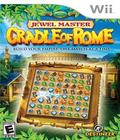Jewel Master: Cradle of Rome for the Wii involves matching up three identical pieces on a playing field that drops new jewels into place every time some are cleared out, and it's easily just as addictive as the other games in the same vein, like Bejeweled and Puzzle Quest. While these games are similar and employ the same match-three premise, Jewel Master lacks any sense of challenge and feels like a grinding quest. Additionally, the "Rome" theme is superficial at best, since it doesn't contribute to any aspect of the gameplay.
The idea behind Jewel Master is that you're building a Roman society, maintaining and building houses, walls, and other structures, in an effort to entice more citizens into your cities. It's not a bad idea and feels like a more puzzle-oriented version of ActRaiser, but the actual puzzle mechanic isn't very challenging. It's certainly addictive to constantly match up three pieces and achieve the goals for each stage, but I never ran into a situation where I couldn't advance because I didn't plan out my steps. Instead, I was always able to randomly match up pieces without any problems.
Having this game on the Wii means that it makes use of the Wiimote as a pointer/mouse device, and for the most part, that control works pretty well. The puzzle pieces are large enough on a bigger display that you don't run into the mistake of mismatching pieces, and even if you do, there isn't really a penalty. It would have been nice if the game had provided an option for standard controls — perhaps holding the Wiimote sideways with the d-pad and face buttons mimicking a regular game pad — but the pointer controls work well enough, so it's not really necessary.
Visually, there isn't a whole lot to see in Jewel Master. There are a variety of pieces that are slowly introduced to the game, and they represent gold, food, wood and other materials. Matching more than three pieces at a time will give you a small point bonus to the related item, and you'll need to gather a certain number of resources in each stage to advance to the next. The idea is that each structure requires a certain amount of each resource before you can begin building it, and it will take quite a few points to complete the entire game.
As I mentioned before, not having a challenge in place other than point hurdles keeps the title from being interesting, and even though the main puzzle mechanic is addictive, there's only so much that you can take before you realize that you're just going through the same boring motions over and over again. Challenge and variety are the spice of life, and it really stands out when both components are missing in a game like this, especially considering how "expensive" it is to buy the structures with the resource points. Even if you think you've amassed quite a bit of wealth and a fair number of items, you're constantly depleting your reserves with every purchase or addition you make to your city, resetting the cycle once again. You're going to be doing a lot of grinding in this game to get through it.
However, if you're into the idea of grinding, then Jewel Master will keep you happy for quite a while. There are 100 different puzzle levels, and they do a pretty good job of constantly throwing new ideas your way. You can sit and grind out resources on a particular level without finishing it easily enough, but if you do want to pass it and go onto the next, you need to look for the highlighted blocks and destroy them. Depending on the setup for a level, it can take some time to get all of them out of the way. Later levels will introduce blocks that are locked and require a certain number of matching pieces to destroy them, and until they're destroyed, you can't move them around like the rest of the board pieces. Another thing that's introduced later on is the idea of the stage being bottlenecked, so paths to the bottom half of the board are blocked off; it's fun to unlock these, if only for the massive amount of pieces that pour to the bottom and randomly match up. I'm not sure what's so satisfying about seeing these random matches and subsequent combos, but in this game and other titles like Bejeweled, there's almost a visceral sense of enjoyment from seeing it occur.
I don't think that Jewel Master: Cradle of Rome is going to hold the attention of most players, and it's obviously being geared toward the casual market, not only because it's on the Wii but because it's available at a budget price. At $20, I can't say that it's not worth picking up, because you could easily get your money's worth of enjoyment and gameplay time, but the whole experience feels hollow. Puzzle Quest has a story structure in place, and its RPG-like features feel far more fleshed out than this. They're both available at the same price, so if you're given the option, I can't see choosing Jewel Master over Puzzle Quest. If you're dying to scratch that Bejeweled itch, though, Jewel Master will certainly fit the bill — until you get bored with it. I'm not sure that I'd recommend jumping into the full game without trying it out first, so maybe you should rent it first.
Score: 6.5/10
More articles about Jewel Master: Cradle of Rome











 Distinctly marrying the Match-3 puzzle mechanic with an enticing resource management system, Cradle of Rome, based on AWEM's 2007 casual PC game, offers players a satisfyingly addictive gameplay experience.
Distinctly marrying the Match-3 puzzle mechanic with an enticing resource management system, Cradle of Rome, based on AWEM's 2007 casual PC game, offers players a satisfyingly addictive gameplay experience.